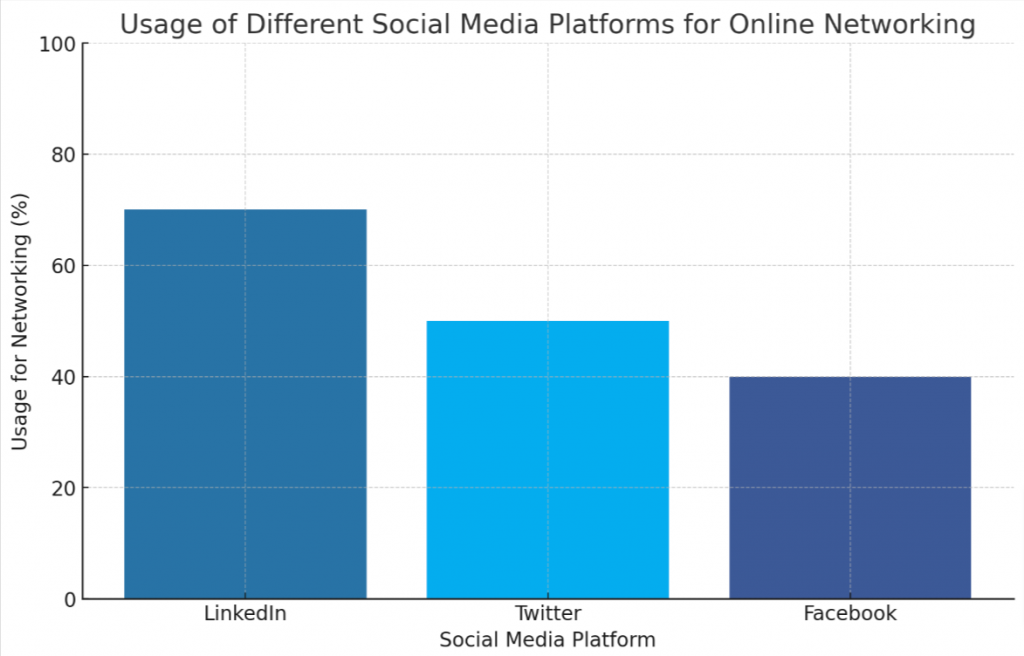Expanding Digital Horizons: Strategies for Effective Online Networking
Online networking often feels overwhelming, as building meaningful connections in the digital realm is different from traditional face-to-face interactions. A LinkedIn survey reveals 80% of professionals deem networking as a career linchpin.
This article will guide you on how to effectively network online, offering insights into identifying your target audience, maintaining positivity and authenticity, leveraging social media platforms, and much more.
Ready for some pro tips? Let’s dive in!
Key Takeaways
- Online networking expands beyond just maintaining a profile and involves using digital tools and social media platforms to cultivate a robust network.
- Utilize social media platforms like LinkedIn, Twitter, and Facebook to create up-to-date profiles that showcase relevant skills and achievements.
- Actively engage with posts by commenting thoughtfully or helping solve problems to increase visibility within networks.
- Attend virtual networking events to connect with industry professionals, prepare beforehand by researching the event, engage actively during the event, and follow up with new contacts afterward.
- Establish authentic connections based on trust, mutual respect, shared interests; share personal stories and offer insightful feedback in conversations.
- Maintain a positive attitude when approaching online networking; it can attract more opportunities and make it easier for others to connect with you.
Understanding the Basics of Online Networking
Online networking expands beyond just maintaining an updated online profile. This aspect of professional growth relies heavily on digital tools and social media platforms to cultivate a robust network.
Key components include not only the use of sites like LinkedIn, Twitter, or Facebook but also participating in virtual networking events such as webinars.
The process starts with creating a strong persona on these platforms through an effective personal brand. This includes adding relevant qualifications and accomplishments on your profiles that could catch the eye of potential connections.
However, it’s essential not to limit yourself to one industry or role but instead build a balanced network comprising different industries and job levels in achieving maximum impact from your online networking efforts.
Actively engaging with posts is another primary element of online networking basics. Engaging does not mean scattergun posting; rather, it insists on making sure the posts you engage are purposeful – contributing meaningful insights to discussions can help make you visible within networks and stand out dynamically among peers and leaders alike.
Essential Tips for Effective Online Networking
Utilize social media platforms, attend virtual networking events, establish authentic connections, and maintain a positive attitude for effective online networking.
Utilize Social Media Platforms
Leveraging social media platforms is an integral part of effective online networking. Sites such as LinkedIn, Twitter, and Facebook provide fertile grounds for creating and nurturing professional relationships.
Up-to-date profiles showcasing your skills, experience, and achievements make a positive first impression on potential connections.
Interaction plays a key role in establishing prominence within these networks. Regularly posting industry-relevant content or sharing interesting newsletters can position you as a resourceful professional.
Engage with posts from others by commenting thoughtfully or helping to solve problems when possible. Such active participation not only increases visibility but also boosts your digital presence across various platforms.
Attend Virtual Networking Events
Attending virtual networking events is a key strategy in online networking.
- Search for relevant online events through social media platforms and industry – specific sites.
- Use digital tools such as Zoom and other video conferencing tools to participate.
- Prepare beforehand by researching the event, its attendees, and the topics to be discussed.
- Engage actively during the event by asking insightful questions or contributing unique ideas.
- Follow up with new contacts after the event, perhaps through a personalized networking message on LinkedIn or Twitter.
- Show patience and persistence because building professional relationships takes time.
- Benefit from learning opportunities that these events offer, such as sharing of white papers or how – to videos.
- Use the opportunity to promote your personal brand by engaging in knowledge sharing and showcasing your expertise.
- Utilization of CRM tool like Shopify can help keep track of all business relationships formed at these virtual events.
Establish Authentic Connections
Establishing authentic connections in online networking is all about building relationships based on trust, mutual respect, and shared interests. Start by sharing a bit of your personal story and unique perspective.
This helps potential contacts get to know you better. Engage in meaningful interactions with others by commenting on their posts or offering insightful feedback. You can even highlight joint accomplishments or celebrate their milestones.
Authenticity trumps formalities when nurturing professional relations over the web, so be genuine in your conversations. Remember that quality trumps quantity; it’s not about how many contacts you have but the strength of those ties.
Maintain a Positive Attitude
Maintaining a positive attitude during online networking is crucial. Research shows that 80 percent of working professionals consider networking to be critical to their careers. When you approach online networking with a positive mindset, you can attract more opportunities and build meaningful connections.
Networking can sometimes feel daunting, especially in the digital realm where face-to-face interaction is limited. However, by maintaining a positive attitude, you can overcome any challenges or setbacks that may arise.
Your optimism will shine through in your interactions and conversations, making it easier for others to connect with you. So keep an open mind, stay optimistic, and embrace the possibilities that online networking has to offer!
The Role of Demographics in Online Networking
Identifying your target demographic is crucial for effective online networking, allowing you to tailor your communication and connect with individuals who are most likely to benefit from your professional network.
Identifying Your Target Demographic
Identifying your target demographic is a crucial step in effective online networking. Understanding who your ideal audience is will help you tailor your communication and focus your efforts on connecting with the right people.
Take into consideration factors such as seniority, industry, and job titles when determining your target demographic. By identifying and honing in on this specific group, you can maximize the relevance of your interactions and increase the chances of building valuable connections that can lead to new opportunities.
Remember, half of all LinkedIn users are decision-makers, making it an excellent platform for targeting professionals in various industries.
Tailoring Communication for Digital Conversations
Tailoring communication for digital conversations is crucial for effective online networking. In the digital age, clear and concise communication is key to making a lasting impression.
It’s important to use appropriate language and tone in your messages to convey professionalism and build trust with your connections. Personalization is also essential – by finding common interests or connections, you can create a sense of rapport and make your conversations more engaging.
So, take the time to craft tailored messages that resonate with your audience and showcase your genuine interest in building meaningful connections in the online sphere.
Creative Tips for Successful Online Networking
Make meaningful connections by reaching out to industry influencers, starting from your inner circle, and developing an elevator pitch that showcases your personal brand.
Making Meaningful Connections
Quality connections are essential when it comes to successful online networking. It’s not just about amassing a large number of contacts, but about building relationships that truly matter.
When making meaningful connections, focus on engaging with others in a genuine and authentic way. Take the time to understand their interests and goals, and find common ground where you can add value or provide support.
By helping others and sharing their work online, you can foster reciprocity in your professional network and build lasting partnerships. Remember that networking is a two-way street – cultivate relationships based on trust and mutual benefit, rather than solely focusing on what you can gain from others.
Starting from Your Inner Circle
Reach out to the people closest to you when starting your online networking journey. Your inner circle, such as friends, family members, and colleagues, can provide valuable connections and introductions that may lead to new opportunities.
These individuals already know you well and are more likely to be willing to help you in your networking efforts. By leveraging the relationships within your inner circle, you can expand your network and tap into their networks as well.
Remember that quality is key in networking, so focus on building genuine connections with those who are most familiar with you before branching out further.
Developing an Elevator Pitch
Crafting a strong elevator pitch is essential for effective online networking. This concise introduction should highlight your unique selling proposition and leave a lasting impression on potential connections.
Keep it memorable and to the point, focusing on what sets you apart from others in your field. A powerful elevator pitch can open doors to new opportunities and help you stand out in a crowded digital landscape.
So, take the time to refine your message and make it compelling enough that others are eager to learn more about you.
The Best Platforms for Online Networking
Twitter, LinkedIn, and attending webinars and online events are some of the best platforms for effective online networking.

Networking on Twitter
Networking on Twitter is an excellent way to connect with professionals and expand your online network. With its instant connection capabilities, Twitter allows users to form meaningful relationships and engage in conversations through tweets that can be connected in narrative threads.
By personalizing networking messages and finding common interests or connections with the person being contacted, individuals can stand out in their network. Engaging with posts by liking, retweeting, or replying also helps to establish a presence within the community.
Actively posting relevant content and sharing industry insights further enhances visibility and credibility among followers. With its wide range of active users from various industries, Twitter provides ample opportunities for networking and collaboration.
Twitter is not only a platform for sharing thoughts but also an effective tool for networking purposes. Its real-time nature allows individuals to instantly connect with professionals across different industries.
Networking on LinkedIn
LinkedIn is widely regarded as the top platform for online networking, with half of all users making important business decisions. To make the most of this professional site, personalize your networking messages and find common interests or connections with the person you’re contacting.
Engaging with posts and actively sharing relevant content can help you stand out in your network. Remember, quality is more important than quantity when it comes to networking on LinkedIn, so focus on creating purposeful and meaningful interactions.
Networking at Webinars and Online Events
Attending webinars and online events is a vital aspect of effective online networking. It provides opportunities to connect with professionals in your industry, gain insights from experts, and expand your network. Here are some key tips for successful networking at webinars and online events:
- Be an active participant: Engage actively during the event by asking questions, sharing thoughts in the chatbox, or participating in discussions. This helps you stand out and make meaningful connections.
- Follow up after the event: After attending a webinar or online event, follow up with the speakers or other attendees who caught your interest. Send a personalized message mentioning something specific from the event to show your genuine interest.
- Join breakout sessions or networking rooms: Many online events offer breakout sessions or networking rooms where participants can have smaller group discussions. Take advantage of these opportunities to connect with like-minded individuals and build relationships.
- Share relevant insights or resources: During discussions or Q&A sessions, share valuable insights or resources that relate to the topic being discussed. This showcases your knowledge and expertise within the industry.
- Utilize social media platforms: Connect with fellow participants on social media platforms like LinkedIn or Twitter. Engage with their posts, comment on their content, and establish further connections beyond the event.
Conclusion
In conclusion, online networking is a powerful tool for expanding your professional network and discovering new opportunities. By utilizing social media platforms, attending virtual events, and establishing authentic connections, you can effectively build relationships in the digital age.
Remember to maintain a positive attitude, personalize your messages, and engage with relevant content to make the most of your online networking efforts.

